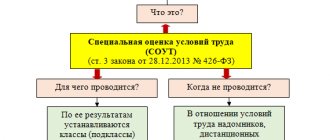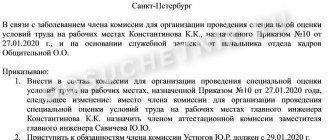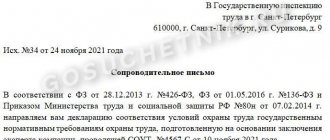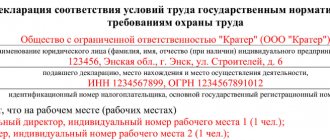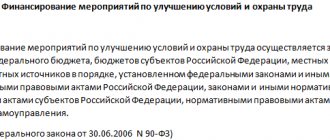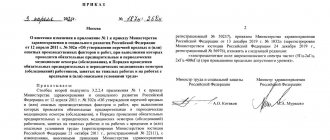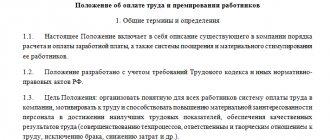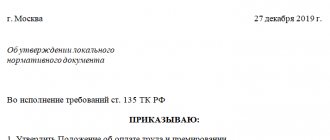The need to assess the conditions in which office employees work has long been questionable: production factors affecting their performance and health were regarded as insignificant compared to those affecting, say, installers or slingers. Regulatory documents governing workplace certification did not take into account the nuances of the work of clerks or managers. But now the procedure for conducting a special assessment of working conditions in Russia is regulated by the provisions of Federal Law No. 426-FZ of December 28, 2013. Its requirements are the same for all categories of jobs. When asked whether it is necessary to carry out SOUT for office workers, the Ministry of Labor answers clearly: it is necessary. But conducting a special assessment in offices has specifics that should be taken into account.
- Simplified special assessment
- Harmful working conditions for office workers
The main thing you need to know
This check is necessary in order to assess the level of exposure to harmful factors on employees during their professional activities. The use of personal protective equipment for personnel is also assessed. This is a whole set of procedures that are designed to detect all the negative factors that a person may have in the workplace. Anyone who has been registered with the tax authority as an individual entrepreneur or legal entity must conduct such a check. After this procedure, each place is assigned its own class, based on the level of harmfulness. The employer pays for the event. The certification is repeated every 5 years.
Regarding office employees
Until the Federal Law on SOUT was issued, office workers were not subject to such testing. But since 2015 the situation has changed. Now everyone who works with computer equipment also undergoes certification. The only exceptions are home-based and remote employees. But the SOUT for the office has a simplified form; there is no examination and measurement, which are provided for by law. If the commission does not find harmful conditions, then a declaration is filled out that the place meets state requirements and the person can work here. This declaration is valid for five years. However, when an accident occurs at work, it is possible to conduct a repeated unscheduled inspection.
SOUT for the office has a simplified form.
It should be noted that only those places where a person spends more than 50% of his working time on computer equipment are subject to certification. If it is less, then verification will not be needed.
The online labor inspectorate answered popular questions about the special assessment of working conditions (SOUT)
The online service Onlineinspektsiya.RF is part of the large-scale long-term project “Open Labor Inspection”. The resource allows a citizen to contact the labor inspectorate when his rights are violated, as well as receive information about other ways to resolve problematic situations in the field of labor relations.
Is it necessary to conduct a special assessment of working conditions in relation to the workplaces of office workers (managerial personnel)?
Yes need.
A special assessment of working conditions is carried out in relation to the working conditions of all employees working for an employer-organization or an employer-individual entrepreneur, with the exception of homeworkers and remote workers.
According to Part 2 of Article 212 of the Labor Code of the Russian Federation, the employer is obliged to ensure a special assessment of working conditions in accordance with the legislation on special assessment of working conditions.
According to Article 3 of the Federal Law of December 28, 2013 N 426-FZ “On Special Assessment of Working Conditions,” a special assessment of working conditions is not carried out only in relation to the working conditions of homeworkers, remote workers and workers who have entered into labor relations with employers - individuals who are not individual entrepreneurs.
Why, in what order and with what frequency is a special assessment of working conditions (WSA) carried out? What are the rights and obligations of the employee and the employer in connection with the SAW?
A special assessment of working conditions (SOUT) is carried out to identify harmful and (or) hazardous production factors and assess the level of their impact on the employee. Based on the results of the assessment system, classes (optimal, acceptable, harmful and dangerous) and subclasses of working conditions in the workplace are established.
SOUT is carried out in relation to the working conditions of all employees working in organizations or individual entrepreneurs, with the exception of homeworkers and remote workers.
To organize and conduct special labor safety procedures, the employer forms a commission consisting of representatives of the employer, including a labor protection specialist, representatives of the elected body of the primary trade union organization or another representative body of workers (if any). If the employer is a small business entity, the commission includes the employer - an individual entrepreneur or the head of the organization.
The work itself on SOUT is carried out by a specialized organization, with which the employer is obliged to conclude an appropriate agreement. Representatives of this organization are not included in the commission.
Before the start of work, the commission approves a list of workplaces at which the special assessment will be carried out, indicating similar workplaces. These similar locations will be subject to the results of the SOUT. Workplaces that are located in one or more of the same type of production premises (areas), equipped with the same (same type) ventilation, air conditioning, heating and lighting systems, in which workers work in the same profession, position, specialty, and carry out the same work, are recognized as similar. functions in the same working hours when conducting the same type of technological process using the same production equipment, tools, fixtures, materials and raw materials and are provided with the same personal protective equipment.
An expert from the organization conducting the special safety assessment identifies (detects) potentially harmful and (or) dangerous production factors in the workplace. The identification results are approved by the commission.
If harmful and (or) dangerous production factors are not identified, the working conditions at this workplace are considered acceptable by the commission. In relation to such workplaces, the employer submits to the territorial state labor inspectorate at its location a declaration of compliance of working conditions with state regulatory labor protection requirements. The declaration is valid for five years from the date of approval of the report of the specialized organization on the implementation of special assessment and assessment work.
If harmful and (or) dangerous production factors are identified, the commission decides to conduct research (tests) and measurements of the actual values of these harmful and (or) dangerous production factors, which are carried out by a specialized organization conducting SOUT.
Based on the results of research (tests) and measurements of harmful and (or) dangerous production factors, which are documented in protocols, an expert from the organization conducting the special labor safety assessment classifies working conditions in the workplace according to the degree of harmfulness and (or) danger to classes (subclasses) of working conditions.
The organization conducting a special assessment of working conditions draws up a report on its implementation, which is signed by all members of the commission and approved by the chairman of the commission.
The employer organizes familiarization of employees with the results of the OSUT at their workplaces against signature no later than thirty calendar days from the date of approval of the report. The specified period does not include periods of temporary disability, vacation, business trip and inter-shift rest of the employee.
Also, the employer, within 30 days from the date of approval of the report, publishes on its website (if available) summary data on the results of the SOUT in terms of establishing classes (subclasses) of working conditions in the workplace and a list of measures to improve the working conditions and safety of workers.
The employer is obliged to ensure that a planned special labor assessment is carried out at least once every 5 years. Unscheduled SOUTH must be provided by the employer in the following cases:
— commissioning of newly organized workplaces;
— the employer receives an order from the state labor inspector to conduct an unscheduled special labor inspection;
— changes in the technological process, the composition of the materials used, raw materials, personal and collective protective equipment, replacement of equipment that can influence the level of exposure to harmful and (or) hazardous production factors on workers;
— an industrial accident that occurred in the workplace or an identified occupational disease, the causes of which were the employee’s exposure to harmful and (or) dangerous production factors;
— the presence of motivated proposals from elected bodies of primary trade union organizations or another representative body of workers to conduct an unscheduled special labor assessment.
The employer is obliged:
— provide the organization conducting the special labor assessment with the necessary information, documents and information that characterize the working conditions in the workplace, as well as explanations;
- do not take any deliberate actions aimed at narrowing the range of issues that need to be clarified during the implementation of the special assessment system and affecting the results of its implementation;
— familiarize the employee in writing with the results of the special assessment and labor assessment and provide the employee with the necessary explanations on issues of implementation at his workplace;
— implement measures aimed at improving the working conditions of workers, taking into account the results of the SOUT.
An employee, when carrying out special assessment work at his/her workplace, has the right to:
— be present during the conduct of the special assessment work, contact the employer and the organization (its expert) conducting the special conduct assessment for clarification on the issues of conducting the special conduct assessment;
— appeal the results of the SOUT.
The employee is obliged to familiarize himself with the results of the SAS at his workplace.
If the employee does not agree with the results of the Special Labor Inspectorate, or if the employer fails to fulfill its obligations in connection with the Special Labor Regulations, the employee has the right to file a complaint with the territorial body of Rostrud - the state labor inspectorate (including through this resource) or with the court.
Is it necessary to conduct a special assessment of working conditions (SLA) in relation to jobs created after the next SLA, the “validity period” of which has not expired?
The commissioning of newly organized workplaces is the basis for conducting an unscheduled special assessment of working conditions (SOUT) in relation to these new places. An unscheduled special assessment must be carried out within 6 months from the date of commissioning of new workplaces.
At the same time, an unscheduled special assessment must be carried out if the new jobs are not similar to those for which the special assessment has already been carried out. Workplaces that are located in one or more of the same type of production premises (production zones), equipped with the same (same type) ventilation, air conditioning, heating and lighting systems, in which workers work in the same profession, position, specialty, perform identical labor functions in the same working hours when conducting the same type of technological process using the same production equipment, tools, devices, materials and raw materials and are provided with the same personal protective equipment.
For similar workplaces, SOUT is carried out in relation to 20% of workplaces from the total number of such workplaces (but not less than two workplaces), and its results are applied to all similar workplaces.
Therefore, if the new jobs are similar to those for which an assessment has already been carried out, and the number of assessed jobs is at least 20% of the total number of “old” and new places, then an unscheduled assessment is not necessary.
The organization is the owner of the office building and the property used to organize workplaces in this building (office furniture, computer and office equipment, lighting fixtures, etc.). The premises in this building are leased on a turnkey basis along with equipped workspaces. If the owner of the building and other property, at his own expense, conducts a special assessment of working conditions (SLA) in relation to all workplaces in the building, do tenants have the right not to carry out a SAW in relation to the workplaces of their employees located in this building?
No, you have no right. A special assessment of working conditions should always be carried out by the employer. Therefore, each tenant, as an employer, will have to independently ensure that a special assessment of the working conditions of its employees is carried out.
According to Part 2 of Article 212 of the Labor Code of the Russian Federation, the employer is obliged to ensure a special assessment of working conditions in accordance with the legislation on special assessment of working conditions.
According to Article 1 of the Federal Law of December 28, 2013 N 426-FZ “On Special Assessment of Working Conditions”, the subject of regulation of this law are relations arising in connection with the conduct of a special assessment of working conditions, as well as with the implementation of the employer’s obligation to ensure the safety of workers in the process of labor activity and the rights of workers to workplaces that comply with state regulatory requirements for labor protection.
Article 4 of Law No. 46-FZ establishes that the employer is obliged to ensure a special assessment of working conditions, including an unscheduled special assessment of working conditions, in cases established by the Law.
According to Article 8 of Law No. 426-FZ, the responsibility for organizing and financing a special assessment of working conditions rests with the employer.
A special assessment of working conditions is carried out jointly by the employer and a specialized organization or organizations attracted by the employer on the basis of a civil contract.
The organization's employees perform their duties at the location of the employer's clients. Who is required to conduct a special assessment of working conditions - the employer or the client organization where the employer's employees actually work?
A special assessment of working conditions should always be carried out by the employer. This also applies to the case when employees perform their duties not on the employer’s territory, but on the territory of the employer’s client. The exception is cases when such workers belong to the category of remote workers, then there is no need to conduct a special assessment of their working conditions at all.
Organizational interaction for the purpose of carrying out special operational management activities with the employer’s clients, at the location of which employees perform their job duties, must be built under agreements with the relevant clients.
According to Part 2 of Article 212 of the Labor Code of the Russian Federation, the employer is obliged to ensure a special assessment of working conditions in accordance with the legislation on special assessment of working conditions.
According to Article 3 of the Federal Law of December 28, 2013 N 426-FZ “On Special Assessment of Working Conditions,” a special assessment of working conditions is not carried out only in relation to the working conditions of homeworkers, remote workers and workers who have entered into labor relations with employers - individuals who are not individual entrepreneurs.
Article 312.1. The Labor Code of the Russian Federation establishes that remote work is the performance of a labor function specified in an employment contract outside the location of the employer, its branch, representative office, other separate structural unit (including those located in another area), outside a stationary workplace, territory or facility directly or indirectly under control of the employer, subject to the use of public information and telecommunication networks, including the Internet, to perform this job function and to carry out interaction between the employer and employee on issues related to its implementation.
Remote workers are considered to be persons who have entered into an employment contract for remote work.
According to Article 1 of the Federal Law of December 28, 2013 N 426-FZ “On Special Assessment of Working Conditions”, the subject of regulation of this law are relations arising in connection with the conduct of a special assessment of working conditions, as well as with the implementation of the employer’s obligation to ensure the safety of workers in the process of labor activity and the rights of workers to workplaces that comply with state regulatory requirements for labor protection.
Article 4 of Law No. 46-FZ establishes that the employer is obliged to ensure a special assessment of working conditions, including an unscheduled special assessment of working conditions, in cases established by the Law.
According to Article 8 of Law No. 426-FZ, the responsibility for organizing and financing a special assessment of working conditions rests with the employer.
A special assessment of working conditions is carried out jointly by the employer and a specialized organization or organizations attracted by the employer on the basis of a civil contract.
Simplified form
The reasons why simplified certification is carried out in the office are as follows:
- There are many identical workplaces in offices, and therefore the commission does not need to check all of them, 20% is enough.
- Some office employees work remotely and certification does not apply to them.
- Measurements and examinations are not carried out if no harmful factors are detected at work, and in offices there are usually none.
But there are still factors harmful to health in offices, they are:
- EM field that arises due to the operation of office equipment.
- The work of the employees is intense.
- Work surfaces may create glare.
But the commission does not consider the listed factors to be unequivocally harmful, so it simply does not take them into account when conducting the SOUT. Documentation for office equipment is not subject to verification, therefore it is not possible to prove its safety. And work intensity is a thing that is generally difficult to classify and is subjective.
Simplified special assessment
Carrying out a special assessment of office space is considered a simpler task: there are a number of reasons for this.
- In offices, there are a significant number of similar workplaces - identically equipped, in which employees of the same positions perform the same functions. According to labor legislation, there is no need to evaluate all of them - it is enough to check 20% of similar places, establishing the same class of working conditions for all of them.
- Many office-based employees work remotely, which also makes the task easier for employers and inspection organizations: no special assessment is carried out for remote workplaces.
- According to paragraph 4 of Article 10 of Federal Law-426, if no harmful or dangerous production factors are identified at the workplace, laboratory measurements and examinations are not carried out. In practice, this means that almost all offices do not require testing - it is extremely rare that office working conditions actually carry a risk of increased injury.
- If, according to the results of the SOUTH of office workers in 2022, only optimal or acceptable workplaces are found in the organization, the employer must draw up a declaration for them on the compliance of working conditions with state regulatory requirements, and then submit it to the State Labor Inspectorate. In accordance with the new edition of Part 4 of Article 11 426-FZ, its validity will be unlimited as long as the previous working conditions are maintained at these workplaces. Moreover, if an accident occurred at one of these places, an employee was diagnosed with an occupational disease, or State Labor Inspectorate inspectors discovered a violation of his labor rights, the validity of the declaration in relation to this position is terminated, and an extraordinary special assessment will need to be carried out on it.
However, there are factors harmful to health in this case, and those who consider office work the safest for health are mistaken.

